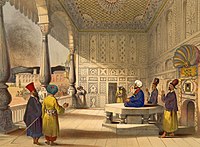
Back تاريخ اليهود في أفغانستان Arabic Juden in Afghanistan German Historia de los judíos en Afganistán Spanish تاریخ یهودیان در افغانستان Persian Afganistanin juutalaiset Finnish Histoire des Juifs en Afghanistan French יהדות אפגניסטן HE افغانستان کې د يهوديانو تاريخ Pashto/Pushto Афганские евреи Russian Afganistan'daki Yahudilerin tarihi Turkish
افغان یهودان יהודי אפגניסטן | |
|---|---|
 Jewish cemetery in the city of Herat, 2009 | |
| Total population | |
| 10,300 | |
| Regions with significant populations | |
| Israel | 10,000 |
| United States | 200 families |
| United Kingdom | 100 |
| Afghanistan | 0[1] |
| Languages | |
| Hebrew, Dari Persian, Tajik Persian, and Pashto | |
| Religion | |
| Judaism | |
| Related ethnic groups | |
| Persian Jews and Bukharian Jews | |
| Part of a series on |
| Jews and Judaism |
|---|
| Part of a series of articles on |
| Religion in Afghanistan |
|---|
 |
| Majority |
| Sunni Islam |
| Minority |
| Historic/Extinct |
| Controversy |
| History of Afghanistan |
|---|
 |
| Timeline |
The history of the Jews in Afghanistan goes back at least 2,500 years. Ancient Iranian tradition suggests that Jews settled in Balkh, a Zoroastrian and Buddhist stronghold at the time. The Kingdom of Judah collapsed in 587 BCE leading to this migration.[2] In more recent times, the community has been reduced to complete extinction.[3][4] At the time of the large-scale 2021 Taliban offensive, only two Jews were still residing in the country: Zablon Simintov and his distant cousin Tova Moradi. When the Islamic Emirate of Afghanistan was re-established by the Taliban in August 2021, both Simintov and Moradi made aliyah on 7 September 2021 and 29 October 2021, respectively, leaving Afghanistan completely empty of Jews. Today, the overwhelming majority of the Afghan Jewish community resides in Israel, with a small group of a few hundred living in the United States and the United Kingdom.
In Afghanistan, the Jews had formed a community of leather and karakul merchants, landowners, and moneylenders.[citation needed] Jewish families mostly lived in the cities of Herat and Kabul, while their patriarchs traveled back and forth on trading trips across Afghanistan; they carved their prayers in Hebrew and Aramaic on mountain rocks as they moved between the routes of the Silk Road.[2]
- ^ "Woman now thought to be Afghanistan's last Jew flees country". independent. 29 October 2021. Retrieved 2021-11-12.
- ^ a b "Balkh". www.jewishvirtuallibrary.org. Retrieved 2018-11-12.
- ^ Aharon, Sara Y. (2011). From Kabul to Queens : the Jews of Afghanistan and their move to the United States. American Sephardi Federation. ISBN 9780692010709. OCLC 760003208.
- ^ Cite error: The named reference
Arbabzadah-2017was invoked but never defined (see the help page).